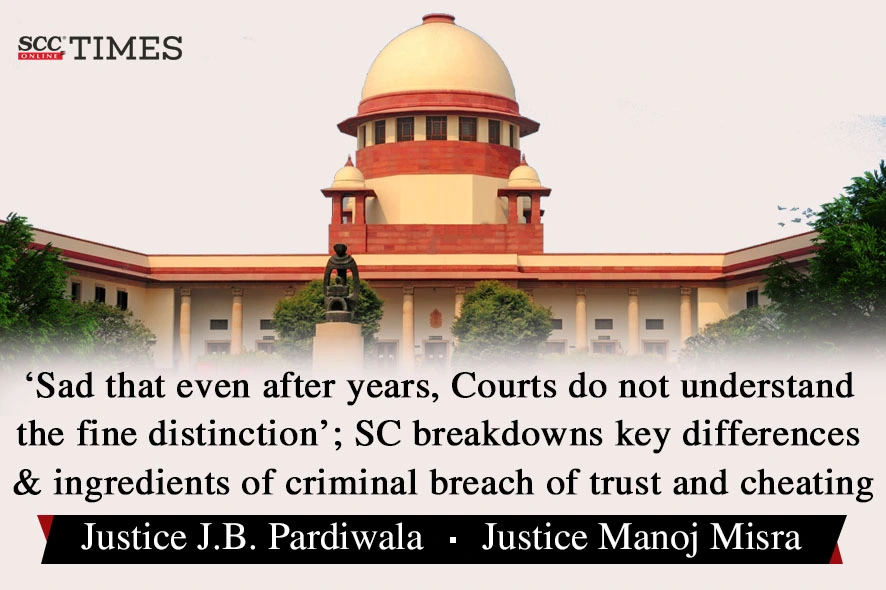Supreme Court: In a criminal appeal against Allahabad High Court’s decision, whereby the application of the present accused entity Delhi Race Club (1940) and its Secretary and President/ accused persons to quash the summoning order passed by the Additional Chief Judicial Magistrate, was dismissed, the Division Bench of JB Pardiwala* and Manoj Misra, JJ. allowed the appeal and set aside the impugned order holding that the entity being a body corporate was liable and Penal Code does not contain any provision for attaching vicarious liability on the part of Secretary and President of the Club who are accused 2 and 3 herein.
Further, the Court explained and dealt with key differences and ingredients of criminal breach of trust and cheating. The two offences cannot coexist simultaneously in the same set of facts. They are antithetical to each other. The Court also observed that the police officers across the country are imparted with proper training in law so as to understand the fine distinction between the offence of cheating viz-a-viz criminal breach of trust.
Factual Matrix
The original complainant/ respondent 2 lodged a private complaint before the Additional Chief Judicial Magistrate against the accused Delhi Race Club (1940) and its Secretary and President for the offence punishable under Sections 406, 420 and 120-B1 respectively of the Penal Code, 1860 (‘IPC’). The Club purchased grains and oats from the complainant for feeding the horses maintained by the Club. According to the complainant, an amount of Rs. 9,11,434/- was due and payable to him by the Club and accused persons towards the sale of horse grains and oats over a period of time. The Trial Court initiated magisterial inquiry under Section 2022 of the Code of Criminal Procedure, 1973 (‘CrPC’). Upon recording the statements of the complainants, the Trial Court issued process for the offence punishable under Section 406 of the IPC. Subsequently, the Club and the accused persons preferred an application under Section 4823 of the CrPC before the High Court, praying for quashing of the said summoning order. The High Court rejected the application and said that the intention on the part of the Club was prima facie mala fide and the payment of Rs. 9,11,434/- was intentionally withheld.
Analysis and Decision
The Court said that the impugned order passed by the High Court was a fine specimen of total non-application of mind. The Court explained that although the complaint was filed for the offence punishable under Sections 406, 420 and 120-B of the IPC yet the Trial Court thought fit to take cognizance and issue process only for the offence of criminal breach of trust as defined under Section 405 of the IPC and made punishable under Section 406 of the IPC.
The Court reiterated that summoning of an accused in a criminal case is a serious matter and criminal law cannot be set into motion as a matter of course. The Magistrate’s order summoning the accused must reflect that Magistrate has applied his mind to the facts of the case and the law applicable thereto. The evidence must be carefully scrutinised by the Magistrate and he may even put questions to the complainant and his witnesses to elicit answers to find out the truthfulness of the allegations or otherwise and then examine if any offence is prima facie committed by all or any of the accused.
In the matter at hand, the Court said that the Penal Code does not contain any provision for attaching vicarious liability on the part of Secretary and President of the Club who are accused 2 and 3 herein. Further, the Club is a body corporate, and it was alleged that the Club/ company committed the offence then there is no question of attributing vicarious liability to the office bearers of the Club so far as the offence of cheating or criminal breach of trust was concerned. Statutes indisputably must contain provision fixing such vicarious liabilities. The office bearers could be arrayed as accused only if direct allegations were levelled against them. The Court added that the Magistrate failed to pose unto himself the correct question as to whether the complaint petition, even if given face value and taken to be correct in its entirety, would lead to the conclusion that the Secretary and President herein were personally liable for any offence.
The Court said that the High Court in the impugned decision completely lost sight of the aspect that when the Magistrate orders police investigation under Section 156(3) of the CrPC he does not take cognizance upon the complaint. It is only upon receipt of the police report that the Magistrate may take cognizance. If at the stage of pre-cognizance, the Magistrate is expected to be careful or to put it in other words, the Magistrate is obliged to look into the complaint threadbare so as to reach to a prima facie conclusion whether the offence is disclosed or not, then he is expected to be more careful when he is actually taking cognizance upon a private complaint and ordering issue of process.
The Court reiterated that “issuance of summons is a serious matter and, therefore, should not be done mechanically and it should be done only upon satisfaction on the ground for proceeding further in the matter against a person concerned based on the materials collected during the inquiry.”
Difference between criminal breach of trust and cheating
The Court referred to S.W. Palanitkar v. State of Bihar (2002) 1 SCC 241, wherein the difference in the ingredients required for constituting an offence of criminal breach of trust (Section 406 IPC) viz-a-viz the offence of cheating (Section 420) was expounded.
In order to constitute a criminal breach of trust under Section 406 of IPC: 1. There must be entrustment with person for property or dominion over the property, and 2) The person entrusted: – a) dishonestly misappropriated or converted property to his own use, or b) dishonestly used or disposed of the property or willfully suffers any other person so to do in violation of: i. any direction of law prescribing the method in which the trust is discharged; or ii. legal contract touching the discharge of trust.
Essential ingredients of Cheating under Section 420 of IPC: 1) deception of any person, either by making a false or misleading representation or by other action or by omission; 2) fraudulently or dishonestly inducing any person to deliver any property, or 3) the consent that any persons shall retain any property and finally intentionally inducing that person to do or omit to do anything which he would not do or omit.
On application of the above discussed essential ingredients on matter at hand, the Court found that the complaint failed to spell out any of the aforesaid ingredients. In order to clear a serious misconception of law in the mind of the police as well as the Trial Courts and High Court, the Court said that if it is a case of the complainant that offence of criminal breach of trust as defined under Section 405 of IPC, punishable under Section 406 of IPC, is committed by the accused, then in the same breath it cannot be said that the accused has also committed the offence of cheating as defined and explained in Section 415 of the IPC, punishable under Section 420 of the IPC.
The Court explained that, mere breach of contract and the offence of criminal breach of trust and cheating has fine difference. In case of cheating, the intention of the accused at the time of inducement should be looked into which may be judged by a subsequent conduct, but for this, the subsequent conduct is not the sole test. Mere breach of contract cannot give rise to a criminal prosecution for cheating unless fraudulent or dishonest intention is shown right from the beginning of the transaction i.e. the time when the offence is said to have been committed. Therefore, it is this intention, which is the gist of the offence. Whereas, for the criminal breach of trust, the property must have been entrusted to the accused or he must have dominion over it. The property in respect of which the offence of breach of trust has been committed must be either the property of some person other than the accused or the beneficial interest in or ownership of it must be of some other person.
The Court also reiterated that in case of sale of goods, the property passes to the purchaser from the seller when the goods are delivered and once the property in the goods passes to the purchaser, it cannot be said that the purchaser was entrusted with the property of the seller. Without entrustment of property, there cannot be any criminal breach of trust. Thus, I in the matter at hand, prosecution of cases on charge of criminal breach of trust, for failure to pay the consideration amount in case of sale of goods was flawed to the core. There can be civil remedy for the non-payment of the consideration amount, but no criminal case will be maintainable for it.
Conclusion
The Court held that, at the most, the Trial Court could have issued process for the offence punishable under Section 420 of the IPC i.e. cheating but in any circumstances no case of criminal breach of trust was made out as there was no entrustment of any property in the case at hand. It was not even the case of the complainant that any property was lawfully entrusted to the appellants and that the same has been dishonestly misappropriated. The present case was plain and simple and it was alleged that the price of the goods sold by him were not paid. The Court explained that once there is a sale, Section 406 of the IPC goes out of picture. Further, even if the Magistrate would have issued process for the offence punishable under Section 420 of the IPC, i.e., cheating the same would have been liable to be quashed and set aside, as none of the ingredients to constitute the offence of cheating were disclosed from the materials on record. Further, the Court advised that if the complainant’s case was that a particular amount was due and payable to him then he should have filed a civil suit for recovery of the amount against the accused, but he could not have approached the Trial Court by filing a complaint of cheating and criminal breach of trust.
CASE DETAILS
|
Citation: Appellants : Respondents : |
Advocates who appeared in this case For Petitioner(s): For Respondent(s): |
CORAM :
Buy Code of Criminal Procedure, 1973 HERE
Buy Penal Code, 1860 HERE
1. Sections 316(2), 318(4) and 61(2) of BNS, 2023.
2. Section 225 of the BNSS, 2023.
3. Section 528 of the BNSS, 2023.












Good